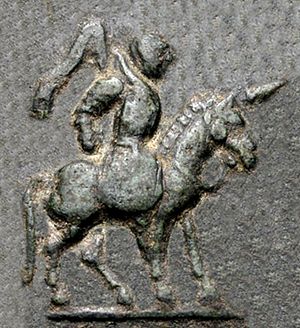Maues
| Maues | |
|---|---|
| Indo-Scythian king | |

Maues riding in armour. Like many other Indo-Scythians, Maues did not issue portraits.
|
|
| Reign | c. 85 – 60 BCE |
| Spouse | Machene |
Maues (Greek: Μαύης; epigraphically ΜΑΥΟΥ Mauou; r. 85–60 BCE) was an Indo-Scythian king who invaded the Indo-Greek territories.
Maues had his capital in Sirkap and minted most of his coins in Taxila. Maues did not manage however to conquer the Punjab territories of the Indo-Greeks east of the Jhelum, which remained under Greek control. After his death the Indo-Greeks regained most of their territory.
Maues is mainly known through his coins, which are often very closely inspired from Indo-Greek coinage. He represented Greek and Indian deities, and used Greek and Kharoshti in coin legends.
This tends to be indicative of a level of respect for Greek culture and a wish to assimilate it, rather than destroy it. Maues probably ruled his conquered territories based on his military might, but otherwise maintained cohabitation with local Greek and Indian communities. It has been suggested that Maues may have been a Scythian general hired by the Indo-Greeks, who would have briefly seized power, before the Indo-Greeks managed to take it back ("Crossroads of Asia").
Maues took the title of "Great King of Kings", an exceeded version of a traditional Persian royal title.
One inscription is known which mentions Maues (usually called the "Moga inscription", and starts with:
Maues issued joint coins mentioned a queen Machene ("ΜΑΧΗΝΗ"). Machene may have been a daughter of one of the Indo-Greek houses.
An Indo-Greek king, Artemidoros also issued coins where he describes himself as "Son of Maues".
A few of the coins of Maues, struck according to the Indian square standard, seemingly depict a King in a cross-legged seated position. This may represent Maues himself, or possibly one of his divinities. It has been suggested that this might also be one of the first representations of the Buddha on a coin, in an area where Buddhism was flourishing at the time, but the seated personage seems to hold a sword horizontally, which favors the hypotheses of the depiction of the king Maues himself.
...
Wikipedia
